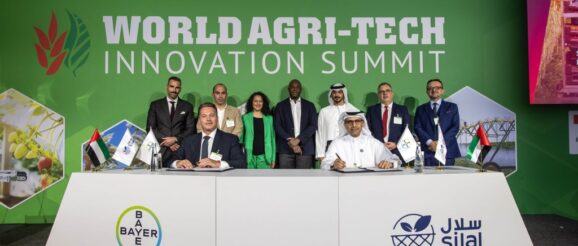SILAL and Bayer Forge Pioneering Partnership to Drive Open Innovation in Agriculture

Silal[i] and Bayer[ii], a global leader in life sciences with a strong focus on healthcare and nutrition, have joined forces in a pioneering collaboration set to strengthen the agricultural landscape in the United Arab Emirates (UAE), addressing climate change as a pivotal concern. The partnership was announced during a signage ceremony of a Collaboration Agreement during the World Agri-Tech Innovation Summit in Dubai on December 4 th , 2023, in attendance of key private and public sector stakeholders. This strategic partnership represents a significant milestone in the journey towards advancing best-in-class agricultural practices, especially under the challenging climatic conditions of the UAE, which are only expected to intensify due to the ongoing threat of climate change. Recognizing the vital role of agriculture in mitigating climate change and enhancing resilience, Silal and Bayer are steadfast in their commitment to bolster the agricultural sector in the battle against global warming. Together, Silal and Bayer will partner to enhance the capabilities of local agronomists, fostering an environment conducive to agricultural innovation and excellence, leveraging Bayer’s BayG.A.P. capacity building program[1]. The program encompasses modules on essential topics such as Integrated Pest Management, Safe Use, Crop Protection Products, Application Technology, and Irrigation. The implementation of the program foresees to follow a train-the-trainer approach. In the first step, agricultural engineers and farm managers will be trained. In the second stage, these trainers will then extend the capacity building efforts to potentially reach over 300 growers in the UAE, who are part of Silal’s network. Another pivotal aspect of this partnership will be the undertaking of comprehensive vegetable seed trials. These trials will encompass a wide array of tomato, cucumber, and melon seed varieties, each meticulously tested in diverse open field and mid-tech greenhouse setups. Further, these trials will embody a range of over 30 vegetable seeds varieties and aim to investigate how these varieties perform under challenging desert farming conditions, assessing their increased crop endurance, quality, and shelf-life characteristics. The research and data collected from these trials will not only benefit agricultural practices in the UAE but will also play a crucial role in informing agricultural practices in regions worldwide grappling with the challenges posed by climate change, especially rising temperatures in combination with high levels of humidity, also known as wet-bulb temperatures. As the world gathers for COP28 (the UNFCCC’s 28 th Conference of the Parties), where discussions on climate change are taking center stage, this partnership underscores the urgency of advancing agriculture to address climate change. Agriculture is both a source of greenhouse gas emissions and a critical tool for sequestering carbon and reducing emissions, making it a central focus in the global climate agenda. Bayer, a global enterprise with a long-standing commitment to improving healthcare and nutrition worldwide, views this partnership as an essential building block for expanding its Open Innovation ecosystem. By collaborating closely with key stakeholders, Bayer seeks to amplify global food security efforts and foster innovation within the agricultural sector, all while championing sustainable practices that combat climate change. Furthermore, this collaboration with Silal is firmly aligned with Bayer’s overarching mission of “Health for All, Hunger for None.” It exemplifies the company’s dedication to addressing the critical challenges of our time by promoting sustainable agriculture and food production, ensuring that no one goes hungry while safeguarding the health and well-being of all. Mr. Salmeen Al Ameri, CEO at Silal, expressed enthusiasm about the partnership, saying, “This collaboration between Silal and Bayer holds immense promise for the future of agriculture in the UAE. By leveraging Bayer’s global expertise and our local knowledge, we aim to develop innovative solutions that will bolster the sustainability of our agricultural practices, against the climate change challenges.” Mr. Hugo Hagen, Senior Bayer Representative – Middle East at Bayer, echoed this sentiment, stating, “We are excited to embark on this journey with Silal, a partner that shares our vision for a world where hunger is eradicated, and health prevails. Together, we will harness the power of innovation to support transforming agriculture in the UAE and contribute to the country’s National Food Security Strategy 2051, all while addressing the urgent global challenge of climate change.” Dr. Shamal Mohammed, Head of AgriTech at Silal added: “This collaboration reflects our commitment to strengthening the UAE’s AgriTech innovation landscape. Our partnership with Bayer will significantly contribute to our Innovation Oasis, and together, we are well-positioned to drive positive change in the agriculture sector.” Mr. Sami Joost, Global Communications Director International Relations & License to Operate – Crop Science and Open Innovation Lead – United Arab Emirates at Bayer, underlined: “At Bayer, we have leading research and development capabilities in plant breeding, biotechnology, chemistry, and data science, allowing us to deliver tailored solutions to farmers faster than ever before. Collaboration with external partners and complementing our in-house expertise with the know-how of excellent partners such as Silal is an integral part of driving innovation impact at Bayer.” This collaboration between Silal and Bayer represents a formidable alliance dedicated to forging new frontiers in agriculture, sustainability, and innovation. As the partnership gains momentum, it is aimed to help inform and shape the future of agriculture in the United Arab Emirates and other regions facing climate challenges in a meaningful way in support to create a safe and sustainable ecosystem for generations to come.
